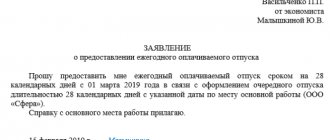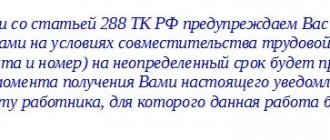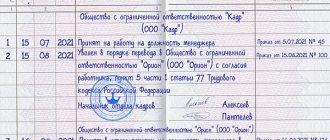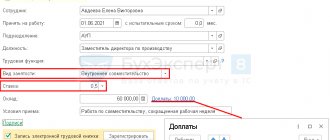Is it possible to work officially while on maternity leave?
We advocate exclusively for official employment and white wages.
It doesn't matter whether you're on maternity leave or not. Therefore, we will talk about how to do everything according to the law. By the way, there is no concept of “maternity leave” in the law. It is usually understood as the totality of:
- maternity leave;
- care leave following the birth of a child for up to 1.5 years;
- further leave until the child’s 3rd birthday.
And each of these stages has its own nuances and restrictions on work. Let's see which ones.
Is it possible to work while on maternity leave?
A woman receives maternity leave on the basis of sick leave. It is also the basis for paying her the appropriate allowance.
Sick leave is issued at 30 weeks for a singleton pregnancy and at 28 weeks for a multiple pregnancy.
For more details, see the article “When to give sick leave for pregnancy and childbirth” .
If you need to fill out a sick leave for a maternity leave, we recommend using the sample from ConsultantPlus. Get trial access to the system for free and proceed to the material.
But the expectant mother is not obliged to leave work on the first day of leave under the BiR. She can continue to work as much as she sees fit. And he will receive a salary for it. But she is not entitled to maternity benefits during her work (see FSS information letter dated October 8, 2004 No. 02-10/11-6671).
See: “Procedure for payment of maternity benefits in 2022” .
As soon as maternity leave is issued, the employee must go on vacation. She will no longer be able to work until the end of this vacation, even on a part-time basis.
A selection of forms from ConsultantPlus will help you correctly fill out all the documents related to an employee going on maternity leave. You can view and download samples by getting free trial access to the system.
Is it possible to work officially while on maternity leave?
It is possible, however, on your own initiative, and not at the request of the employer.
Please note that the legislation does not contain the concept of “maternity leave”. Therefore, the possibility of working depends on the type of vacation, which we will discuss below. In practice, this term is applied to two periods: leave due to pregnancy and childbirth (hereinafter referred to as Maternity leave) and leave to care for a newborn minor child.
Decree on BiR
This type of maternity leave is provided on the basis of sick leave, issued at the 30th week of pregnancy (28th - in case of multiple pregnancy). However, going on maternity leave is a worker’s right, not her responsibility. Find out the nuances of determining the date of maternity leave.
In other words, having received the opportunity to go on maternity leave due to her pregnancy, the employee may not immediately take leave and continue to work as long as her desire and health are sufficient. The courts also agree with this opinion regarding official work in late pregnancy. An example of this is the resolution of the Federal Antimonopoly Service of the Volga-Vyatka District dated October 28, 2008 in case No. A31-357/2008-7.
Important! You should know that a woman on maternity leave cannot simultaneously count on both payment of benefits under the BiR and receipt of wages. In addition, maternity leave taken after the 30th week of sick leave is not subsequently extended for the period after childbirth (letter of the Social Insurance Fund dated October 8, 2004 No. 02-10/11-6671).
It is impossible to call a maternity leave early from leave under the BiR at the initiative of the employer (Part 3 of Article 125 of the Labor Code of the Russian Federation). However, a pregnant woman can go to work, interrupting her labor and employment leave at her own request, but this requires the permission of the manager from the letter of Rostrud dated May 24, 2013 No. 1755-TZ). In this case, it will be necessary to recalculate the B&R benefits already paid before going on vacation.
Is it possible to work during maternity leave on the basis of a civil contract? Yes, this is quite acceptable, but it is important that in its form such an agreement is not similar to an employment agreement, i.e. that it does not contain the mandatory conditions prescribed in Art. 57 Labor Code of the Russian Federation. So, this may be a contract agreement drawn up on the basis of Art. 702 of the Civil Code of Russia, or a contract for the provision of paid services in accordance with Art. 779 of the Civil Code of the Russian Federation. Persons working under such contracts are not subject to labor legislation (Part 7, Article 11 of the Labor Code of the Russian Federation).
Child care decree
Having taken leave to care for a newborn child after completing maternity leave, the young mother/father can continue to officially work - at home or on a part-time basis. At the same time, after completing her “pregnant” sick leave, she may not go on leave to look after the child, but simply go back to work full time and not submit any applications for leave. If an employee has gone on UzR leave, the employer can call him back only by agreement (Part 2 of Article 125 of the Labor Code of the Russian Federation).
Thus, a maternity leaver has several options for building labor relations:
- A young mother can interrupt her vacation early and go to work for the whole working day. At the same time, the right to take maternity leave is acquired by her closest relatives: the child’s father, his working grandfather/grandmother, adult aunt/uncle. The maternity leaver herself will receive a full salary, and the care allowance can be issued by the person who will actually care for the child. The maternity leaver retains the right at any time before the child’s third birthday to go on leave to care for him again, but then the right to it is lost by the relative caring for the child instead of the mother.
- The employee has the right, without interrupting his vacation (while maintaining benefits), to officially go to work on a part-time basis with the consent of the employer (Clause 2, Article 11.1 of the Law “On Compulsory Social Insurance in Case of Temporary Disability and in Connection with Maternity” dated December 29, 2006 No. 255-FZ). It is also possible to switch entirely to home working. There is also no need to interrupt vacation for this, but the employer has the right to refuse to provide work in this mode if the employee was not a homeworker before the maternity leave.
- While on maternity leave at his main place of work, the employee will be able to enter into an employment contract with the same or another employer and work part-time. And the number of part-time jobs can be unlimited (Part 2 of Article 282 of the Labor Code of the Russian Federation).
Another opportunity to earn extra money for a maternity leaver caring for her child while on leave from her main place of work is to perform one-time work on the basis of a civil contract.
Is it possible to work on parental leave for up to 1.5 years?
The Labor Code states that while on maternity leave, you can work part-time, and you can also work remotely (see Part 2 of Article 93, Part 3 of Article 256 of the Labor Code of the Russian Federation). At the same time, the right to receive child benefits remains.
ATTENTION! We are talking about the baby’s mother, but father, grandmother, grandfather, and other relatives may be on vacation on the same basis.
See what documents are needed to apply for child benefits .
How many hours can you work on maternity leave?
The work schedule during maternity leave is established by mutual agreement of the employee and the employer. For part-time, it can be a half-day or a half-week, or a combination of both. But if the working day is irregular - only a partial week with a full working day (Article 101 of the Labor Code of the Russian Federation). When working from home, the work schedule can be any, including reduced working hours.
Since a working mother will receive both a salary and a benefit, and the benefit is paid by the Social Insurance Fund, abuse must be avoided. Shortening the working day should objectively free up time for the baby. If it is 15–30 minutes a day or even an hour, social insurance may deny benefits.
Working on maternity leave
Maternity leave, or maternity leave, is provided to working women and is divided into two parts:
Veronica Netsova
worked on maternity leave
Author profile
Only pregnant women are entitled to maternity leave. During maternity leave, she receives maternity benefits, which is calculated based on average earnings for two years.
Not only the woman, but also her husband or another close relative, such as a grandmother or grandfather, has the right to parental leave, but only one person who actually cares for a small child. You can go on parental leave until your child is three years old.
During maternity leave, the woman or relative who is caring for the child retains her position, and maternity leave is included in the work experience.
Working on maternity leave is regulated by two standards:
- Labor Code of the Russian Federation - Art. 255 “Maternity leave” and Art. 256 “Parental leave”.
- Federal Law of December 29, 2006 No. 255-FZ “On compulsory social insurance in case of temporary disability and in connection with maternity.”
Only a pregnant woman can go on maternity leave and on the basis of an application and a certificate of incapacity for work - sick leave.
Both a young mother and other close relatives can take maternity leave to care for a child up to three years old, this does not depend on the degree of relationship. Vacation can be used in full or in parts: for example, first mom can go on vacation, then dad or grandma.
You can officially work while on maternity leave if you work part-time in the office or at home.
You can work on maternity leave in your specialty at your previous place of work, get a part-time job, or do what you love and open an individual entrepreneur.
At a new job. While on maternity leave, you have the right to take another position and work part-time, but no more than four hours a day or half the monthly working time from your main job. You can work remotely under a part-time employment contract or under a civil law contract.
The nuances of working on parental leave for children under 3 years old
In general, the rules for working on parental leave for a child up to 3 years, including documentation, coincide with the above rules for leave up to 1.5 years. The key difference is that when the child reaches the age of 1.5 years, the mother’s right to receive child benefits ceases. This means that the employer and employee no longer face accusations of insufficient (formal) reduction of working hours and there is no risk of refusal to pay social insurance benefits.
What payments are available for children under 3 years of age? For children born before December 31, 2019, until they reach 3 years of age, compensation in the amount of 50 rubles is paid. per month. But some parents are entitled to a larger amount.
Read more about payments for children in our section on child benefits.
Vacation under the GPC agreement
One of the difficult issues when concluding a GPC agreement for the parties is the issue of registration of vacation and vacation payments.
Civil contract - is it entitled to leave in general cases?
To solve the problems of their business, many Russian business entities often practice concluding GPC agreements instead of employment contracts - this allows them to optimize taxation, reduce risks and costs for providing social guarantees. This approach also offers certain advantages for the performers themselves - usually this is a higher level of income and the absence of opportunities for direct administrative influence of management on work activities.
At the same time, any social guarantees that are mandatory for labor relations are not taken into account in a civil contract - these include the right to annual paid leave, and also, in some cases, to unpaid leave. In addition, they do not include civil law relations and mandatory regulation of some other aspects of labor activity - for example, payment of severance pay, ensuring the right to remain at work, maternity benefits and sick leave.
You can read more about how a GPC agreement differs from an employment contract in a separate article.
Next, we will directly consider the regulation of relationships under the GPC agreement and vacations in the context of such relationships.
Indeed, despite the fact that the legislation does not directly establish such an obligation for the customer, often, in fact, GPC agreements can include an almost complete social package provided for labor relations.
How much do they pay when working on maternity leave?
It all depends on the employee’s remuneration system. If it is time-based, payment should be proportional to the time worked. Piece workers are paid for the volume completed (Part 3 of Article 93 of the Labor Code of the Russian Federation).
Work at home is paid as usual if it is full time. If incomplete, only for the time worked.
Whether it is possible to deny an employee maternity leave while working part-time or at home, find out from the Ready-made solution from ConsultantPlus. Trial access to the system is provided free of charge.
How to get back to work after maternity leave
As follows from Part 1 of Art. 256 of the Labor Code of the Russian Federation, an employee must submit a corresponding application to the employer to apply for leave to look after his newborn child. Let's look at a few typical situations:
- An employee can apply for parental leave to care for a minor child as soon as the child’s mother’s labor leave ends, or after some time. The cut-off point for maternity leave is when the child reaches three years of age.
- If a woman on maternity leave does not plan to go on another maternity leave after finishing her sick leave due to labor and labor, she simply goes to work. There is no need to write any statements in this regard.
- Having gone on leave under UzR, an employee can exercise his right to work from home or under the conditions prescribed in Art. 93 Labor Code of the Russian Federation. To do this, you will need to write a corresponding application and submit it to the employer (Part 3 of Article 256 of the Labor Code of the Russian Federation).
Based on an employee’s application for intention to return to work on a home-working or part-time basis, the employer issues a corresponding order. Based on the order, additional information is being prepared. agreement to the employment contract (after all, its terms have changed significantly), which is signed by both parties.
Is it possible to work part-time while on maternity leave or under a GPC contract?
It is possible to work part-time while on maternity leave. The same procedure applies here as at the main place, and the same restriction: you cannot work while on maternity leave, and after it ends - completely.
As for work under the GPC agreement, there are no obstacles at all. The conclusion of such contracts (contracts, provision of services) is regulated not by the Labor Code, but by the Civil Code. And it consolidates the free expression of the parties. In addition, the GPA does not give the employee any rights in terms of benefits and social guarantees related to children. This means that the employer will not have any trouble with regulatory authorities.
How to go on maternity leave if you already work part-time
The Labor Code (Articles 282 and 60.1) establishes the right of an employee to perform labor duties for several employers at once. That is, an employee can perform additional work for additional money during the time when he is not busy at his main workplace.
If a woman becomes pregnant while working part-time, she can go on maternity leave, and then on maternity leave.
But it is necessary to document this fact without errors. Going on maternity leave for a part-time worker is no different in terms of the registration procedure from going on maternity leave for the main employee. The employee simply prepares the necessary documents, writes a statement to the employer, and the organization, in turn, issues a corresponding order.






